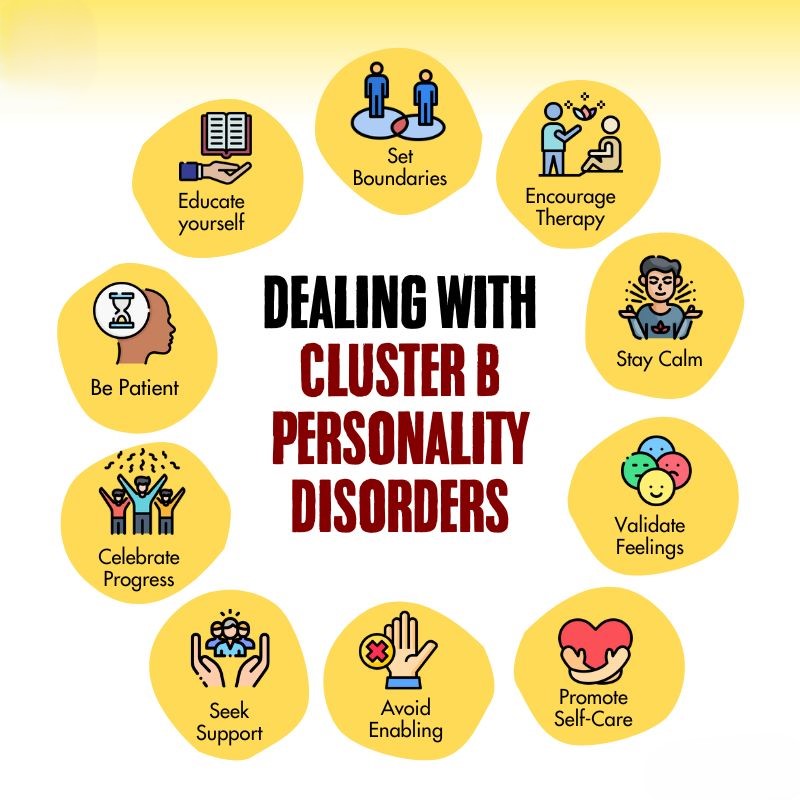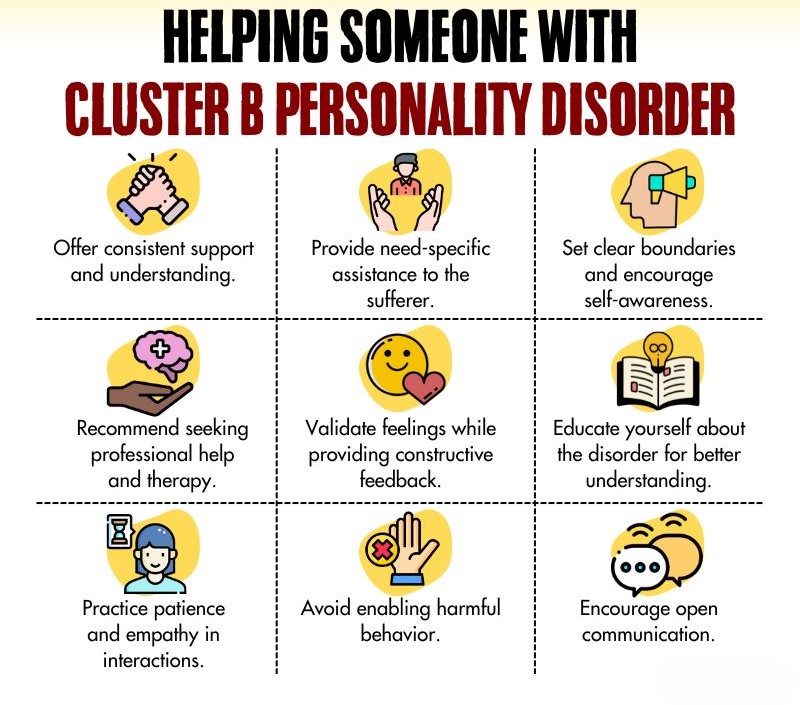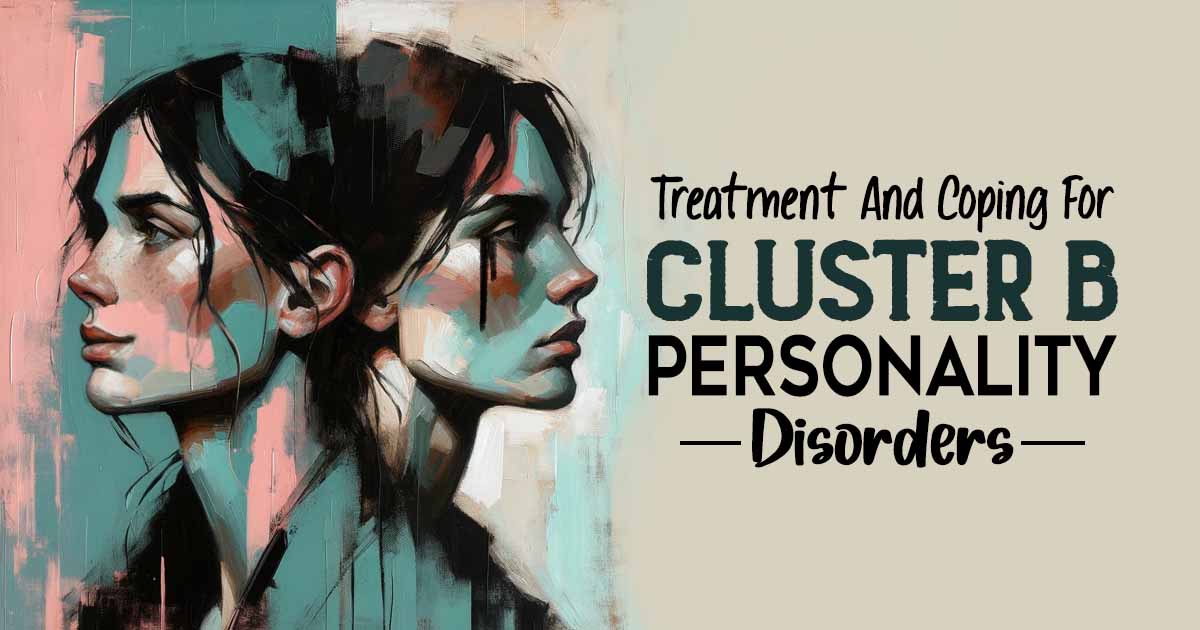Cluster B personality disorders present unique challenges for both individuals and their loved ones. These disorders are characterized by pervasive patterns of behavior 1 Fariba, K., Gupta, V., & Kass, E. (2020). Personality Disorder. PubMed; StatPearls Publishing. Available from: https://www.ncbi.nlm.nih.gov/books/NBK556058/ that can significantly impact relationships, work, and overall quality of life. However, with effective cluster B personality disorders treatment, individuals can learn to navigate their symptoms and lead fulfilling lives.
Cluster B Personality Disorder Diagnosis
A cluster B personality disorder diagnosis 2 Lunghi, C., Cailhol, L., Massamba, V., Laouan Sidi, E. A., Sirois, C., Rahme, E., Rochette, L., Renaud, S., Villeneuve, E., Koch, M., Biskin, R., Martineau, C., Vincent, P., David, P., & Lesage, A. (2023). Psychotropic medication use pre and post-diagnosis of cluster B personality disorder: a Quebec’s health services register cohort. Frontiers in psychiatry, 14, 1243511. https://doi.org/10.3389/fpsyt.2023.1243511 typically involves a thorough psychiatric evaluation with structured clinical interviews and any cluster B personality disorder test. This commonly includes the SCID-II or the Personality Assessment Inventory (PAI), along with collateral information from family or friends. Clinicians assess patterns of behavior, emotions, and interpersonal relationships, looking for pervasive traits related to cluster B personality disorders.
Cluster B Personality Disorders Treatment
Common cluster B personality disorders treatment usually encompass a combination of psychotherapies and medication 3 Jemal, M., Tessema, W., & Agenagnew, L. (2022). Cluster B personality disorders and its associated factors among psychiatric outpatients in Southwest Ethiopia: institutional-based cross-sectional study. BMC psychiatry, 22(1), 500. https://doi.org/10.1186/s12888-022-04143-3 :
A. Pharmacotherapy
Pharmacotherapy in cluster B personality disorders treatment involves several antidepressants, mood stabilizers, and antipsychotics:
- Antidepressants: Selective serotonin reuptake inhibitors (SSRIs) such as sertraline and fluoxetine may help with symptoms of depression and anxiety that often accompany cluster B personality disorders.
- Mood Stabilizers: Medications like lithium or anticonvulsants such as valproate can be beneficial in managing impulsivity and mood swings, particularly in individuals with borderline personality disorder.
- Antipsychotics: In some cases, antipsychotic medications like olanzapine or quetiapine may be prescribed to address psychotic symptoms or severe mood disturbances.
B. Psychotherapy
Studies 4 Kraus, G., & Reynolds, D. J. (2001). The “A-B-C’s” of the cluster B’s: identifying, understanding, and treating cluster B personality disorders. Clinical psychology review, 21(3), 345–373. https://doi.org/10.1016/s0272-7358(99)00052-5 recommend the following psychotherapies for cluster B personality disorders treatment:
Read More About Psychotherapy Here
1. Dialectical Behavior Therapy (DBT)
DBT is highly effective for borderline personality disorder, focusing on emotional regulation, interpersonal skills, mindfulness, and distress tolerance.
2. Cognitive Behavioral Therapy (CBT)
CBT helps individuals challenge and change negative thought patterns and behaviors, which can be beneficial for all Cluster B disorders.
3. Schema-Focused Therapy
This type of therapy targets the underlying schemas (deeply held beliefs) that contribute to maladaptive behaviors and emotional responses.
4. Transference-Focused Psychotherapy (TFP)
TFP focuses on understanding and managing intense interpersonal relationships, common in borderline, histrionic and narcissistic personality disorders.
C. Alternative Therapies
Cluster B personality disorders treatment often includes alternative therapies 5 Schulz, P., & Hede, V. (2018). Alternative and complementary approaches in psychiatry: beliefs versus evidence. Dialogues in clinical neuroscience, 20(3), 207–214. https://doi.org/10.31887/DCNS.2018.20.3/pschulz like:
1. Mindfulness And Meditation
Practices that promote mindfulness can aid in emotion regulation and coping with stress, common challenges for affected individuals.
2. Yoga And Tai Chi
These practices combine physical movement with mindfulness, promoting relaxation and reducing impulsivity and anxiety.
3. Art Therapy
Engaging in creative activities can be therapeutic, providing an outlet for expression and processing emotions.
Read More About Art Therapy Here
4. Animal-Assisted Therapy
Interactions with animals have been shown to reduce anxiety and improve mood, offering unique benefits for those with Cluster B disorders.
Dealing With Cluster B Personality Disorders: Self-help Tips

Consider the following tips 6 Angstman, K. B., & Rasmussen, N. H. (2011). Personality disorders: review and clinical application in daily practice. American family physician, 84(11), 1253–1260. for dealing with cluster B personality disorders:
- Educate yourself about Cluster B disorders.
- Seek therapy to learn coping strategies.
- Practice mindfulness and grounding techniques.
- Set boundaries with toxic individuals.
- Engage in activities that promote self-care and develop self-esteem.
- Journal to track emotions and patterns.
- Surround yourself with supportive people.
- Develop healthy communication skills.
- Avoid self-blame and practice self-compassion.
- Consider support groups for validation and shared experiences.
Read More About Mindfulness Here
Helping Someone With Cluster B Personality Disorder

Helping someone who is dealing with cluster B personality disorders involves offering non-judgmental support, encouraging them to seek professional therapy 7 Soeteman, D. I., Verheul, R., Delimon, J., Meerman, A. M., van den Eijnden, E., Rossum, B. V., Ziegler, U., Thunnissen, M., Busschbach, J. J., & Kim, J. J. (2010). Cost-effectiveness of psychotherapy for cluster B personality disorders. The British journal of psychiatry : the journal of mental science, 196(5), 396–403. https://doi.org/10.1192/bjp.bp.109.070482 , and learning about the disorder to understand their experiences better. Encourage healthy coping strategies, such as mindfulness and setting boundaries, while gently guiding them towards self-care activities and validating their emotions. It’s important to maintain patience, empathy, and a consistent presence while also taking care of your own well-being.
Takeaway
Cluster B personality disorders treatment involves a multifaceted approach, including therapy, self-care strategies, and support from loved ones. With dedication to therapy and the development of healthy coping mechanisms, individuals can work towards managing their symptoms and improving their overall well-being.
At A Glance
- Cluster B personality disorders present challenges for individuals and relationships.
- Cluster B personality disorders treatment combines pharmacotherapy, psychotherapy, mindfulness techniques, etc.
- Self-help tips include education, therapy, mindfulness, setting boundaries, self-care, journaling, healthy communication, and seeking support.
- Helping someone
- Helping someone dealing with cluster B personality disorders involves non-judgmental support, therapy encouragement, promoting coping strategies, patience, empathy, and self-care.















